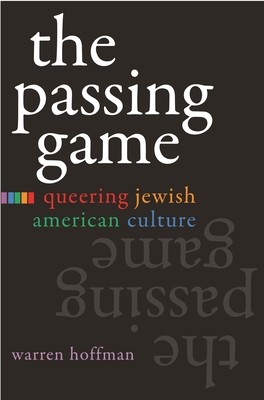
- We will send in 10–14 business days.
- Author: Warren Hoffman
- Publisher: Syracuse University Press
- Pages: 216
- ISBN-10: 0815632029
- ISBN-13: 9780815632023
- Format: 15.8 x 23.4 x 2 cm, hardcover
- Language: English
- SAVE -10% with code: EXTRA
Reviews
Description
Tony Kushner's award-winning epic play Angels in America was remarkable not only for its sensitive engagement of Jewish-American and gay culture but also for bringing these themes to a mainstream audience. While the play represented a watershed in American theater and culture, it belies a hundred years of previous attention to queer Jewish identity in twentieth-century American literature, drama, and film. In The Passing Game, Warren Hoffman sheds light on this long history, taking up both Yiddish and English narratives that explore the tensions among Jewish identity, queer sexuality, performance, and American citizenship.
With fresh insight Hoffman examines the 1907 Yiddish play God of Vengeance by Sholem Asch, the cross-dressing films of Yiddish actress Molly Picon, and several short stories by Isaac Bashevis Singer. He also analyzes the English-language novels The Rise of David Levinsky (Abraham Cahan), Wasteland (Jo Sinclair), and Portnoy's Complaint (Phillip Roth). Hoffman highlights the ways in which the characters in these canonical texts attempt to "pass" as white, straight, and American in the early and mid-twentieth century. This pioneering work is a welcome contribution to the study of Jewish American literature and culture.EXTRA 10 % discount with code: EXTRA
The promotion ends in 16d.06:03:32
The discount code is valid when purchasing from 10 €. Discounts do not stack.
- Author: Warren Hoffman
- Publisher: Syracuse University Press
- Pages: 216
- ISBN-10: 0815632029
- ISBN-13: 9780815632023
- Format: 15.8 x 23.4 x 2 cm, hardcover
- Language: English English
Tony Kushner's award-winning epic play Angels in America was remarkable not only for its sensitive engagement of Jewish-American and gay culture but also for bringing these themes to a mainstream audience. While the play represented a watershed in American theater and culture, it belies a hundred years of previous attention to queer Jewish identity in twentieth-century American literature, drama, and film. In The Passing Game, Warren Hoffman sheds light on this long history, taking up both Yiddish and English narratives that explore the tensions among Jewish identity, queer sexuality, performance, and American citizenship.
With fresh insight Hoffman examines the 1907 Yiddish play God of Vengeance by Sholem Asch, the cross-dressing films of Yiddish actress Molly Picon, and several short stories by Isaac Bashevis Singer. He also analyzes the English-language novels The Rise of David Levinsky (Abraham Cahan), Wasteland (Jo Sinclair), and Portnoy's Complaint (Phillip Roth). Hoffman highlights the ways in which the characters in these canonical texts attempt to "pass" as white, straight, and American in the early and mid-twentieth century. This pioneering work is a welcome contribution to the study of Jewish American literature and culture.

Reviews